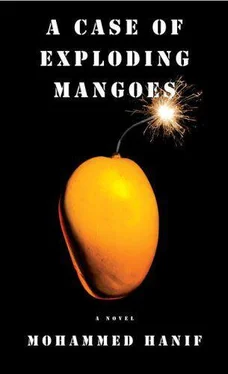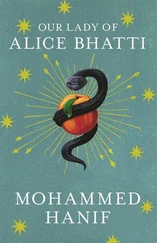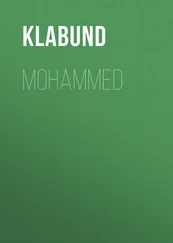“Brother Raphel, you have not had lunch with us,” General Zia says in a complaining voice and takes Arnold Raphel’s hand in both his hands and starts walking towards Pak One. “I know you were taking a siesta with Jesus and Mary.” General Zia puts an arm around his waist and lowers his voice to a whisper. “Now we must put our heads together and suck national security.” Arnold Raphel, still reeling from his spiritual encounter with the Carmelite sisters and their singing orphans, thinks General Zia is cracking a joke.
Arnold Raphel looks towards his Cessna, his mind races through a list of excuses, but by the time he reaches something starting with Nancy, General Zia’s arm is around his waist and he is marching him up the ladder into Pak One.
General Akhtar buries his face in his hands and looks down through his fingers at the fluffy white carpet on the floor of the VIP pod. He notices a thin streak of blood crawling towards him. He traces it to its source and sees that General Zia’s shiny oxfords are oozing blackish red blood. He panics and looks at his own shoes. They are spotless. Suddenly a ray of hope, faint but a ray of hope nonetheless, penetrates the doom engulfing his soul. Maybe the Shigri boy has inflicted an inner wound and Zia is bleeding to death. Maybe the plane will get to Islamabad safely. Maybe he’ll have to rewrite his speech, just changing the lines about an unfortunate accident to President’s sudden demise . Would he be ready to take over the country if the plane makes it to Islamabad? General Akhtar suddenly remembers a long-forgotten prayer from his childhood and starts to mutter it. Then halfway through his prayer, lie changes his mind and lunges towards the VIP pod’s door. “Major Kiyani, tell the crew to keep the air condi-toning off, the President is not feeling too well.”
“By jingo, I am dandy,” General Zia protests, then looks down at the puddle of blood around his shoes on the carpet, but like a junkie in denial, he refuses to make a connection between the grinding pain in his abdomen, the fluid trickling down his pants and the streak of blackish-red blood on the carpet. He decides he needs to change the subject. He wants to take the conversation to a higher level so that nobody would notice the blood on the floor. He knows that the only person he can rely on is Arnold Raphel.
The C130’s doors secured, the pilot move his throttles forward and the four propellers start picking up speed. General Zia looks towards Arnold Raphel and says to him in a pleading voice, “We’ll buy those tanks. What a sensitive machine have you built. But first, tell me how will history remember me.” The voices in the VIP pod are being drowned out by the din of the aeroplane. Arnold Raphel thinks General Zia is asking him about the target sensors on the Abram One tank. Arnold Raphel, Carmelite orphans’ hymns still ringing in his head, loses his cool for a moment and gives the first and the last undiplomatic statement of his life. “No, Mr President, they are as useless as tits on a boar.”
General Zia can’t believe what Arnold Raphel just said: the world would remember him as a bit of a bore.
In a moment of panic General Zia feels that he must rectify this historical misconception. There is no way he was going to go down in the textbooks as the President who ruled this country of one hundred and thirty million people for eleven years, laid the foundations of the first modern Islamic state, brought about the end of communism but was a bit of a bore. He must tell them a joke, he decides. Hundreds of hilarious one-liners that he has tested in his cabinet meetings run through his mind and blur into one endless cosmic joke. He rehearses one in his head. He knows that jokes are all about timing. “What did the seventy houris say when they were told that they would spend the eternity with General Zia in paradise?” He can’t remember the houris’ exact words. There was something about being condemned to hell for eternity but it’s dangerous to tell a joke if you can’t get your punchline right. Then a flash of genius. He must tell a family joke. He wants to be remembered as a witty man. But he also wants to be remembered as a family man.
“Because the First Lady thinks he is too busy screwing the nation,” he says jumping in his seat. It is only when nobody around him laughs that he realises he has blurted out the punchline and now can’t remember the rest of the joke. He yearns for a moment of lucidity, a flash of clarity that would cut through the muddle that is his mind. He looks around at the wretched faces, and realises that he will not remember this joke. Ever.
He turns to General Akhtar in an attempt to preserve his legacy and keep the conversation going. “How do you think, Brother Akhtar, history will remember me?” General Akhtar is pale as death. His thin lips are muttering all the prayers he can remember, his heart has long stopped beating and his underpants are soaked in cold sweat. Most people faced with certain death can probably say a thing or two they have always wanted to say, but not General Akhtar. A lifetime of military discipline and his natural instinct for sucking up to his superiors overcome the fear of death and with shivering hands and quivering lips General Akhtar tells the last lie of his life. “As a good Muslim and a great leader,” he says, then takes out a crisp white handkerchief from his pocket and covers his nose.
As I watch them gather on the red carpet near the ladder up to the C130, I begin to wonder if I should have trusted Uncle Starchy’s folksy pharmacology. General Zia is still standing on his feet with his one arm around General Akhtar’s waist. They look like lovers who don’t want to let go of each other. Maybe I should have thrust the blade in the back of his neck when I had him at the tip of my sword. Too late now. I am already strapped in a seat in General Beg’s plane. He offered me a lift after I was offloaded from Pak One. Our Cessna — his Cessna — waits on the tarmac for Pak One to take off. Protocol demands that Pak One should leave the runway first.
“Good to see you, young man.” He waves his peaked cap at me. He opens a fat book with a fat man on its cover and starts flicking through the pages, lacocca: An Autobiography reads the title. “Lots of work to do.” He nods towards the pilot.
What’s with books and soldiers? I wonder. The whole bloody army is turning into pansy intellectuals.
I look out of the window as the American Ambassador walks up to General Zia; double handshakes, hugs as if the General is not meeting the ambassador after two hours but has found his long-lost sibling. General Zia’s grin widens, his teeth flash and his other arm wraps itself around the ambassador’s waist. Bannon is in his suit, standing behind them, puffing nervously on a cigarette. There is an air of important men sharing a joke, spreading goodwill. It’s only when they start climbing the stairs that I realise that General Zia is dragging his feet. He is almost hanging onto the shoulders of the two men flanking him. “The elephant will dance, the elephant will drag his feet, the elephant will drop dead.” Uncle Starchy had given me a step-by-step guide to the effects of his nectar.
If I hadn’t been sitting on that plane I would have flung my peaked cap in the air and shouted three cheers for Uncle Starchy.
General Beg notices the grin on my face and wants to take the credit. “You have come a long way, my boy. From that horrible Fortress to my plane; imagine the journey. Managing an army is not very different from managing a corporation.” He caresses fat lacocca’s face. “Treat your people well, kill the competition and motivate, motivate, motivate.” He pauses for a moment, savouring his own eloquence. “My plane will take us to Islamabad.” He turns towards the pilot. “My plane could drop you at the Academy but I think it’s better that you take a jeep from there. I have to attend to some important business in Islamabad. I need to be in Islamabad.” He taps the pilot’s shoulder. “When will my plane reach Islamabad?”
Читать дальше












